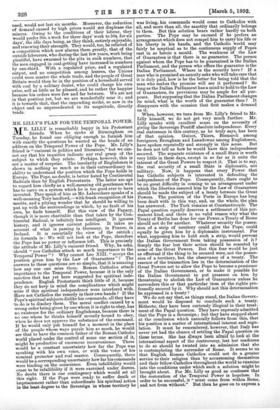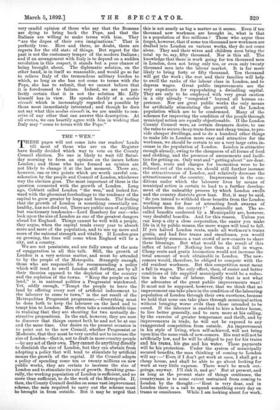MR. LILLY'S PLAN FOR THE TEMPORAL POWER.
MR. LILLY is remarkably happy in his Protestant friends. When he spoke at Birmingham on Tuesday, be found one obliging enough to furnish him with exactly the questions he wanted as the heads of an address on the Temporal Power of the Pope. Mr. Lilly's friend is "eminent in politics and literature," but we can- not say that his inquiries indicate any real grasp of the subject to which they relate. Perhaps, however, this is not a matter of surprise. The insularity of Englishmen is shown in nothing so much as in their extraordinary in- ability to understand the position which the Pope holds in Europe. The Pope, no doubt, is better hated by Continental Radicals than by English Protestants. The latter are apt to regard him chiefly as a well-meaning old gentleman who has to carry on a system which he is too good ever to have invented. They speak of him as Mr. Labouchere speaks of a well-meaning Tory landlord,—with frank recognition of his merits, and a pitying wonder that he should be willing to put up with the surroundings in which, by no fault of his -own, he finds himself. But this view of the Papacy, though it is more charitable than that taken by the Con- tinental Radical, is infinitely less intelligent. It ignores history, and it ignores current politics. It takes no account of what is passing in Germany, in France, in Ireland. It is essentially the view of the ostrich ; its formula is : We will not look at the Pope, therefore the Pope has no power or influence left. This is precisely the attitude of Mr. Lilly's eminent friend. Why, he asks, should " you Catholics attach so much importance to the Temporal Power " ? Why cannot Leo XIII. " accept the position given him by the Law of Guarantees " ? The answers to these questions are so simple, that it is amazing how any one can miss them. Roman Catholics attach importance to the Temporal Power, because it is the only sanction that has yet been suggested for spiritual inde- pendence. English Protestants think little of it, because they do not keep in mind the complications which might arise if this spiritual independence were interfered with. Have not Catholics the remedy in their own hands ? If the Pope's spiritual subjects dislike his commands, all they have 'to do is to disobey them. The moral conflict caused by a -wrong order being given by one whom it is right to obey, has no existence for the ordinary Englishman, because there is no one whom he thinks himself morally bound to obey, when he does not approve the substance of the command. If he would only put himself for a moment in the place of the people whose ways puzzle him so much, he would see that to have the common father of the Roman Catholic world placed under the control of some one section of it, might be productive of enormous inconvenience. There would be a constant uncertainty how far the Pope was speaking with his own voice, or with the voice of his nominal protector and real master. Consequently, there would be a corresponding uncertainty how far his commands were binding on the conscience. Even infallibility would cease to be infallibility if it were exercised under duress. No doubt there is one contingency which would set all this right. If the Pope were ready to suffer death or imprisonment rather than subordinate his spiritual action in the least degree to the Sovereign in whose territory he was living, his commands would come to Catholics with all, and more than all, the sanctity that ordinarily belongs to them. But this solution bears rather hardly on both parties. The Pope may be excused if he prefers an arrangement which does not compel him to carry his life or his liberty in his hands, and the Catholic world may fairly be sceptical as to the continuous supply of Popes cast in so heroic a mould. The weakness of the Law of Guarantees is that there is no guarantor. The person against whom the Pope has to be guaranteed is the Italian Parliament, and the person who offers the guarantee is the Italian Parliament. Where is the security here ? If a man who is promised an annuity asks who will take care that it is duly paid, how is he the better for being told that the man who makes the promise will see it performed ? So long as the Italian Parliament has a mind to hold to the Law of Guarantees, its provisions may be ample for all pur- poses. But supposing that the Italian Parliament changes its mind, what is the worth of the guarantee then ? It disappears with the occasion that first makes a demand on it.
When, however, we turn from Mr. Lilly's friend to Mr. Lilly himself, we do not get very much further. Mr. Lilly speaks with excellent sense on the necessity of giving the Sovereign Pontiff absolute independence. Every real statesman in this century, as he truly says, has been of that opinion. Guizot, Thiers, Bismarck among foreigners, Brougham and Lansdowne among Englishmen, have spoken repeatedly and strongly in this sense. But he does not tell us how he would have this independence secured. The separate existence of a small State is worth very little in these days, except in so far as it suits the interest of the Great Powers to respect it. That is to say, the real security of a small State is diplomatic, not military. Now, it happens that every Power that has Catholic subjects is interested in defending the independence of the Pope. Consequently, there ought to be no great difficulty in coming to an arrangement under which the liberties assured him by the Law of Guarantees should be made the subject of a treaty between the Great Powers. The position of the Porte in Europe has long been dealt with in this way, and, on the whole, the plan has answered. The Turk remains at Constantinople. The Papal question equally deserves a settlement of this per- manent kind, and there is no valid reason why what the Treaty of Berlin has done for one Power, a Treaty of Rome should not do for another. Whatever security the posses- sion of a strip of territory could give the Pope, could equally be given him by a diplomatic instrument. For what, supposing him to hold such a strip, would prevent the Italian Government from taking possession of it ? Simply the fear lest their action should be resented by some of the Great Powers. But this fear would be just as effectual if the thing to be secured were, not the posses- sion of a territory, but the observance of a treaty. The essence of the transaction lies in the determination of the Great Powers not to allow the Pope to become a pensioner of the Italian Government, or to make it possible for the Italian Government to put pressure on him by threatening to abolish the Law of Guarantees unless he surrenders this or that particular item of the rights pro- fessedly secured by it. Why should not this determination be expressed in a treaty ? We do not say that, as things stand, the Italian Govern- ment would be disposed to conclude such a treaty. Hitherto, they have been curiously illogical in their treat- ment of the Papal question. They have expressly admitted that the Pope is a Sovereign ; but they have stopped short at the conclusion which naturally follows from this, that his position is a matter of international interest and regu- lation. It must be remembered, however, that Italy has never yet had the chance of settling the Papal question on
these terms. She has always been afraid to look at the international aspect of the controversy, lest her readiness
to do so should be twisted into an admission that she is contemplating the surrender of Rome. It seems to us that English Roman Catholics could not do a greater service to their religion than by accustoming themselves and their fellow-Catholics throughout the world to examine into the conditions under which such a solution might be brought about. For Mr. Lilly as good as confesses that the restoration of the Temporal Power is hopeless. In order to be successful, it " must come from within Rome, and not from without." But then he goes on to express a very candid opinion of those who say that the Romans are dying to bring back the Pope, and that the Italians are willing to make terms with him. They " are the dupes of their own imaginations." That is perfectly true. Here and there, no doubt, there are regrets for the old state of things. But regret for the past is not the customary temper of the modern Italians ; and if an arrangement with Italy is to depend on a sudden revolution in this respect, it stands but a poor chance of being brought about. The diplomatic solution, on the other hand, is in itself so reasonable, and would go so far to relieve Italy of the tremendous military burden to which, so long as she has not come to terms with the Pope, she has to submit, that we cannot believe that it is foredoomed to failure. Indeed, we are not per- fectly certain that it is not the solution Mr. Lilly himself has in view. He speaks darkly of a modus vivendi which is increasingly regarded as possible by those most immediately interested ; and though he does not say what this modus vivendi is, we are unable to con- ceive of any other that can answer this description. At all events, we can heartily agree with him in wishing that Italy may " come to terms with the Pope."



































 Previous page
Previous page